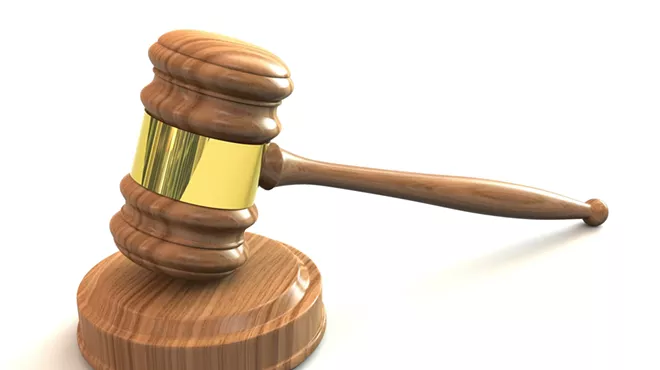Two of the 12 Spokane County Superior Court judges have drawn challengers this year, and that's a rarity in the general election. The remaining 10 uncontested judges are automatically retained for another four years.
Since 2000, no more than one Spokane Superior Court judge has been challenged per year. In 2008 and 2012, all 12 judges ran unopposed in the general election and were automatically retained.
One challenger in this year's election — Ward Andrews, a local attorney who specializes in civil law — says he sees room to bring efficiency to Superior Court. He points to statistics indicating the high number of motions, known as affidavits of prejudice, filed against his opponent, Judge Linda Tompkins. Those motions are statements from attorneys saying they can't get a fair hearing from a particular judge.
Each side is allowed to file this motion only once per case, and attorneys don't have to give a reason.
Tompkins says she is aware of the affidavits, and suggests that some are a result of office-wide policies not to appear before her after attorneys disagreed with her rulings.
"I understand there are segments of practitioners that have this generalized concern, and they have a right to do that," she says. "But I have a role to play for the community, and the lawyers who come in front of me, to be totally just. I cannot bend to that pressure."
Tim Fennessy, also a civil attorney, calls for more diversity on the bench in his bid against Judge Greg Sypolt.
Notably, not all current Superior Court judges were willing to put their names behind both incumbents. All 11 endorsed Sypolt, but only five sitting Superior Court judges endorsed Tompkins.
"Spokane County Superior Court enjoys a collegial, supportive environment," says Judge Harold Clarke III. "However, the issues with regard to Judge Tompkins and the resulting increase as to the workload for the rest of the bench are readily apparent. As a result, I am not endorsing Judge Tompkins in this election."
TOMPKINS V. ANDREWS
Linda Tompkins began her legal career as clerk in the State Court of Appeals before moving on to the local firm Lukins & Annis. She was appointed to Spokane's Superior Court in 1997. In her nearly 20 years on the bench, she has heard every type of case, but holds a fondness for the work in therapeutic courts, such as drug court, where defendants are diverted from jail and into treatment and housing.
"I remember her compassion and the energy she had for that docket," says Superior Court Judge Maryann Moreno. "She made a significant impact."
City councilman and local civil rights attorney Breean Beggs agrees.
"I just know that she tends to follow the Constitution and follow the law that benefits everyday people, even if it might be unpopular with certain interests," Beggs says.
Tompkins, 64, also expresses her excitement for the reforms coming out of the Spokane County Regional Law & Justice Council — the new statistical tool that will aid judges in making bail or release decisions, for example.
"What we've learned is that money bond is not an accurate measure for community safety or even return to court," she says. "What results is very dangerous offenders are out in the community because they can post bond, and poor defendants are in jail for months before trial, and they're not dangerous."
Her challenger for Position 10, Ward Andrews, sees some inefficiencies in Superior Court. Andrews currently works exclusively in the civil realm as an in-house attorney for Farmers Insurance.
He explains the frustrations of civil attorneys and their clients, who will sometimes wait more than a year before they can get in front of a judge after filing a lawsuit, and he points to the affidavits of prejudice filed in Tompkins' courtroom as part of the problem.
"The stats show that my opponent is removed regularly by attorneys on all sides of the fence," he says.
According to statistics compiled by the Spokane Superior Court Administrator's Office, Tompkins received about 32 percent of all affidavits filed in Superior Court in 2009, 16 percent in 2010, 18 percent in 2011, 29 percent in 2012, 26 percent in 2013 and 28 percent in 2014.
There is, however, some debate over whether these motions are an accurate metric for a judge's integrity.
"Sometimes attorneys may not agree with a judge's ruling, and they will decide not to appear in front of that judge anymore," Moreno says. "That becomes problematic when you have entire offices doing that, but I think we've all been subject to the 'sending a message' affidavit."
Spokane County Prosecutor Larry Haskell did not respond to repeated requests for comment. The Spokane County Public Defender's Office also declined to comment for this article.
SYPOLT V. FENNESSY
Judge Greg Sypolt spent nearly 20 years as a Spokane County public defender before then-governor Mike Lowry appointmented him to the Superior Court bench.
For the past three years, Sypolt, 67, has mainly presided over criminal cases in the pretrial stages, which is virtually unheard of. Typically, judges rotate off that particular assignment after a year.
"It's just such a grueling docket, so when you get near the end of that first year, you're exhausted," says Superior Court Judge Annette Plese, who has endorsed Sypolt, but not Tompkins.
Talk to someone about Judge Sypolt, and inevitably the word "diversity" will come up. In 2004, he helped establish a diversity section of the Spokane County Bar. During judges' meetings, he's always the one to ensure that minority groups are considered in decision-making.
But it's diversity that Tim Fennessy, his opponent for Position 11, says is lacking on the current bench.
"We don't have anybody up there who has the plaintiff's civil experience that I do, and I think that's important," Fennessy says.
He adds some frustration over what some would argue is a broken judicial election system.
Eight of the 12 current Superior Court judges were initially appointed by the governor. Although some have faced challengers in the past, the incumbent undoubtedly has the advantage.
"The practice has been that judges run for a four-year-term and then retire or resign," Fennessy says. "In the last couple resignation and appointment processes, the resigning judge has taken a stance on who should replace them, and it's my understanding that the governor seriously considers who the exiting judge thinks ought to get appointed."
BLURRED LINES
Judicial elections are paradoxical.
On the one hand, elections give the public buy-in for the justice system, says David Brody, a WSU criminal justice professor who has studied judicial elections. On the other hand, not much information about judges is readily available, and the majority of judges don't face challengers and are automatically retained.
Superior Court judges in Spokane County, who preside over felony-level criminal cases and civil lawsuits, pride themselves on collegial and productive professional relationships. That's a good thing, says Ron Miles, the former Superior Court administrator who retired earlier this year. Judges' willingness to help each other allows cases to flow through the system quickly and promotes the overall administration of justice.
But the tight-knit group can present a problem for the public. Fearing they will upset those delicate relationships or undermine the public's overall confidence in the court, most judges are not willing to say anything to shed negative light on a fellow jurist.
The same can be said for most attorneys, who are largely unwilling to publicly utter anything disparaging about a judge who could preside over their cases down the road.
That means unlike elections for city councilmembers, state representatives or the President of the United States, the very people who work closely with these judicial candidates, and who are arguably in the best position to accurately inform the public, choose not to do so out of self-preservation.
The public can turn to statistics, such as the number of times attorneys file affidavits of prejudice or how many times a judge's decision has been reversed in appellate courts. But there are flaws with those metrics, and most of that information is not readily available.
In a 2008 survey conducted by Brody and a colleague, one of the most prominent frustrations with judicial elections was the frequency with which judges retire midterm and an appointed jurist takes his or her place.
"It's kind of a political game to get appointed," Brody says. "You generally need to be active in the bar association, and to some extent share common views as the governor."
Among all judicial offices statewide, including the Supreme Court, Court of Appeals and Superior Courts, 84 percent of judicial elections were uncontested in 2008, according to Brody's research.
This year, for Superior Court alone, 86 percent of the open seats statewide are uncontested.
"We elect judges to give the people a voice and a say in the government," Brody says. "Having two-thirds of judges not stand for election doesn't seem to show that purpose." ♦
The Spokane County Bar Association conducted a poll of three of the four candidates; 302 local attorneys rated Tim Fennessy and Superior Court judges Greg Sypolt and Linda Tompkins on a scale of 1 to 4 in five categories. Ward Andrews opted not to participate. Here's how they scored:
Linda Tompkins
• Legal ability: 2.48
• Judicial Temperament: 2.91
• Integrity: 3.02
• Relevant Legal Experience: 2.78
• Suitability: 2.54
Greg Sypolt
• Legal ability: 3.42
• Judicial Temperament: 3.38
• Integrity: 3.51
• Relevant Legal Experience: 3.54
• Suitability: 3.47
Tim Fennessy
• Legal ability: 2.78
• Judicial Temperament: 2.87
• Integrity: 2.98
• Relevant Legal Experience: 2.89
• Suitability: 2.79






















